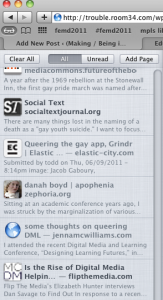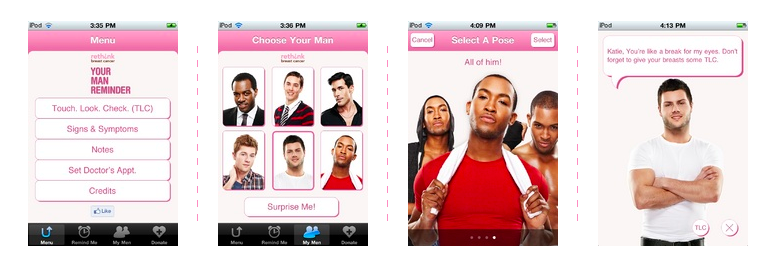 The end of the semester is here (well, almost…I still have some assignments to grade) and it’s time to get organazized. I thought I’d start by cleaning out and archiving some links that I put on my Safari Reading list over the past few months. I wonder, should I include all of them so as to document what I found interesting enough to mark, or should I cull the best of these links? Considering I have 40 to read through, I think I might try to be a little judicious. Here’s the list:
The end of the semester is here (well, almost…I still have some assignments to grade) and it’s time to get organazized. I thought I’d start by cleaning out and archiving some links that I put on my Safari Reading list over the past few months. I wonder, should I include all of them so as to document what I found interesting enough to mark, or should I cull the best of these links? Considering I have 40 to read through, I think I might try to be a little judicious. Here’s the list:
1. Education Needs a Digital Upgrade: This source is a NYTimes review of Cathy Davidson’s Now You See It, which I bought right after it came out and have read the first chapter so far. I can’t wait to finish it over the next couple of weeks. Skimming through the review article, I found this great bit:
To take an example of just one classroom convention that might be inhibiting today’s students: Teachers and professors regularly ask students to write papers. Semester after semester, year after year, “papers” are styled as the highest form of writing. And semester after semester, teachers and professors are freshly appalled when they turn up terrible.
Ms. Davidson herself was appalled not long ago when her students at Duke, who produced witty and incisive blogs for their peers, turned in disgraceful, unpublishable term papers. But instead of simply carping about students with colleagues in the great faculty-lounge tradition, Ms. Davidson questioned the whole form of the research paper. “What if bad writing is a product of the form of writing required in school — the term paper — and not necessarily intrinsic to a student’s natural writing style or thought process?” She adds: “What if ‘research paper’ is a category that invites, even requires, linguistic and syntactic gobbledygook?”
What if, indeed. After studying the matter, Ms. Davidson concluded, “Online blogs directed at peers exhibit fewer typographical and factual errors, less plagiarism, and generally better, more elegant and persuasive prose than classroom assignments by the same writers.”
Yes! I definitely agree with Davidson. Many of my assignments, including my informal writing assignments for my feminist debates class this semester, are based on challenging and rethinking the typical writing a term paper approach by having students write a lot online. I think I need to write a blog entry about this assignment and about writing-as-process assignments for my classes. I’ll have to bring in Davidson and Now You See It.
2. fbomb is a really sweet feminist blog created and maintained by teenage feminists. It’s a great resource for anyone who wants one example of how young feminists are organizing/reflecting/acting/critically thinking/connecting online. Plus, their blogroll is really helpful for finding new blogs to check out.
3. Sir Ken Robinson on Creativity and Changing Educational Paradigms This link is to a brain pickings summary (and if you scroll down to the bottom of the post, there are some great links to other posts you might like, like this one: 7 Must-Read Books on Education, which lead me to this book–which I’m thinking of checking out: DIY U: Edupunks, Eduprenuers, and the Coming Transformation which I found on amazon and that has some pretty interesting looking “customers who bought this book also bought” selections. Uh oh. I’m going down the rabbit hole here…better stop). Here’s the Robinson’s video, which I may or may not have posted here before?
4. A Queer Culture and Social Media Study Here’s the description on the blog:
The Queer Culture & Social Media Study is a documentary-style project exploring a queer generations relationship to social media and how that has influenced their sense of community and identity.
I haven’t watched all of the videos here, but it seems important to archive it for future reference; the explicit focus on negotiating identity and community in relation to social media is intriguing.
5. Flip the Media, various sources. The original post that I saved on my Safari Reading List was Is the Rise of Digital Media Helping, or Hurting, Queer Youth? Flip the Media’s Elizabeth Hunter interviews Dan Savage to find out I need to read the article more closely, but my initial response is: That’s the wrong question to be asking. I think this is a good resource + the comments at the end generate an interesting discussion. When I clicked on the home page for Flip the Media, which is the “blog of the University of Washington Master of Communication in Digital Media,” I found another article that I’d like to archive here…and maybe as an “oh bother!” too: Viral Video of the Week–Breast Cancer Awareness Here’s the PSA:
I am bothered by the heteronormativity (assumed heterosexual as natural) and the idea that women should/will be inspired to regularly care for themselves just so they can ogle hot guys. I want to think more about this campaign, because they also have a free App to encourage you to check your breasts. Hmm…an app that is about women and care. My immediate reaction to this app/campaign is “OH BOTHER!” However, I’m willing to think about it some more. I just downloaded the free app and have set it up the reminder on Thursdays at 4 (so in less than 30 minutes). Will I remember that I set this up? Doubtful. Next week, I will get my “man reminder” at some inopportune time and an awkward moment will ensue.

As I was finishing up this post, I got my first Man Reminder. Here it is (I was disappointed that the “hot guy” doesn’t actually speak to me):
An interlude: This cleaning out sources is a lot of fun…and a lot of time. It’s a great exercise for getting inspired, being curious and thinking critically. I think it would be cool to do something like this on a weekly basis.
6. Uses of Blogs TOC This book looks like it’s worth taking a look at…maybe reading ch 1 which is online. However, the book was published in 2006. How dated are these articles? What relevance do they have for contemporary social media/blogging issues? Doing research on social media is a tricky thing, especially when it’s constantly changing. What are the best ways to write about online technologies for a scholarly audience? I know there some great resources for thinking through this question, but that’s another blog post…
7. How Blogging Helps Students Crush the Digital Divide My ability to be curious is failing me right now, so this will have to be the last source I archive right now. Posted on July 21, 2011 on GOOD, it is about an elementary teacher who used blog writing to train a class who had previously had limited access to tech training and writing in English (over 60% were ESL students). A key claim in the article: giving students blog assignments encourages them to be creative and better writers + it provides them with digital literacy skills. While I really appreciate the focus here (and the claim), I wonder: Does this really crush the digital divide?



Comments are closed.